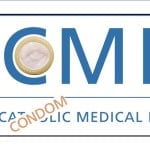
In February, the Lepanto Institute published a report showing promotion and distribution of condoms by the Catholic Medical Mission board. In the report were statements from the current and former CEO of CMMB, both voicing their support for the use of condoms to combat HIV/AIDS, as well as screen captured images of official government documents showing that CMMB distributed condoms in South Sudan.
It’s not surprising that CMMB declined to comment on the report, however, the Lepanto Institute has recently learned that CMMB has denied any wrongdoing to its supporters. Someone recently forwarded an email they received from CMMB:
Good Morning xxxxxxxx,
Thank you for taking the time to contact us directly in response to the recent media attention surrounding the allegations of condom distribution in our work.
It is important to know the truth surrounding our programs and work. CMMB does not purchase, receive, or distribute donations of condoms. The educational programs that CMMB supports focus on individual responsibility, monogamy, respect, religious faith, and basic healthcare. We do provide our partners complete and accurate information about family planning as part of our HIV prevention efforts. Our goal in all our work related to the prevention of HIV is always to preserve and honor the sanctity of life; a fundamental component of our Catholic identity.
Additionally, CMMB follows national guidelines established by the ministry of health, and those of the presiding conference of Catholic Bishops in each country where our programs are located. We uphold and embrace the teachings of the Catholic Church and seek to express our faith through both our actions and words.
I ask that you continue to pray for our work and for those whose lives are being transformed through your generosity and support. We focus our work on saving the lives of the most vulnerable people on the planet; mothers and children, and we thank you for your commitment to providing Healthier Lives Worldwide.
May God Bless you,
Catholic Medical Mission Board
Everything CMMB said in this statement can be reduced to a single line: “CMMB does not purchase, receive, or distribute donations of condoms.” What CMMB may not be aware of is that we have documentation, obtained through the Freedom of Information Act, submitted by them to the federal government telling quite a different story.
You can examine the FOIA documentation we obtained by clicking the link here: CMMB FOIA Docs.
We’ll just dispel the myth of CMMB’s claims right off the bat. Found on page 31 of the FOIA documents is this excerpt from the Introduction portion of CMMB’s Year 2 Annual Progress Report to PEPFAR and the CDC. As you can clearly see in the image below, it says rather plainly that “CMMB’s scope of work conforms to the Sudan CDC/PEPFAR mission as outlined below … such as condom distribution.”

From CMMB’s own annual reports, it makes very clear that it was in charge of the ANISA Project, and that the ANISA Project did indeed distribute condoms. Regardless of whether the Catholic Medical Mission Board actually, physically handled the condoms in question, the fact of the matter is that it was responsible for the implementation of a project that included the distribution of condoms.
There are 75 pages of documentation that we obtained through the Freedom of Information Act, but it only takes a few pages to make it clear that not only did CMMB distribute condoms … CMMB reported the distribution itself.
The first document in the set is a “CMMB Response to CDC Comments on ANISA Year 3 Report.” In other words, this document is a set of responses from CMMB to the CDC clarifying a few matters that the CDC found unclear. On page 4 of the FOIA docs, the CDC makes a comment on something it found on page 6 of CMMB’s Year 3 Annual Report. To clarify the matter, CMMB wrote a paragraph as requested on their exit interviews of clients receiving their HIV Testing and Counseling (HTC) services. One thing CMMB indicates is that “consistent condom demonstrations” will be improved.

On page 5, CMMB addressed another question from the CDC, indicating that “condom demonstrations continued to reach high risk young girls during year 3.”

On page 6, the CDC requested copies of the condom-promotion leaflets that were adopted and designed by the ANISA Project, as reported by CMMB. CMMB responded that it attached those leaflets to its response. We are currently attempting to obtain copies of those leaflets.

CMMB’s “REVISED Annual End of the Year Report: Year 3” begins on page 7 of the FOIA documentation.

Three pages into this revised year 3 annual report (page 10 of the FOIA documents), is a “Summary of Year 3 Annual Progress.” The report says, “Measurable outcomes are determined on an annual basis by the CDC/PEPFAR Sudan team, in consultation with CMMB. The outcomes for Year 3 of ANISA are listed below.” And listed under “Primary Prevention” it shows “24 targeted condom service outlets” and indicates that “23 individuals trained to promote HIV/AIDS prevention through other behavior change beyond abstinence and/or being faithful.” Of course, “prevention through behavior change beyond abstinence, etc” means condom promotion and distribution.

To clarify this, we jump to page 19 of the FOIA documents for section IR 1.4 of the ANISA Year 3 Annual Report titled: “Communities adopt prevention practices beyond abstinence and/or being faithful.”
Right at the top of page 19, CMMB makes absolutely clear what the title of this section means. It says, “ANISA reached 43,121 with individual and/or small group level prevention interventions that are based on evidence and/or meet the minimum standards required, including condom demonstration and distribution.”
It then goes on to say that:
“Promotion of condom use forms a large component of the OP (out patient) campaign. Peer educators are given special topics on condoms and their role in controlling the spread of HIV. ANISA adopted and designed condom promotion leaflets with pictures showing correct use of condoms and benefits. Condoms are regularly distributed to outlets in lodges, bars, salons and trailer parks in Yamibo, Nzara, and Ezo. Through their network, peer educators have identified 24 individual condom distributors (15 male, 9 female) who are regularly supplied with condoms.”
On the following page, CMMB indicates certain barriers to the success of this portion of its project. In this section, CMMB laments that illiteracy is acting as an impediment to the acceptance of condom use.

In order to rectify this problem, CMMB says in the “Challenges and Resolutions” portion of section 1.4 that condom supplies and availability need to be streamlined. CMMB then declares that it will direct the ANISA project to work in Year 4 to ensure condoms are readily accessible:

Beginning on page 29 of the FOIA documents is CMMB’s Year 2 Annual Report to the CDC.

In the executive summary of the Year 2 Annual Report (page 30 of the FOIA docs), CMMB indicated that there was an interruption in the supply of condoms.


On page 38 of the FOIA documents, CMMB provides details on how many condoms its project distributed to men and women.

On page 39 of the FOIA documents, CMMB again complained that there was a shortage in the supply of condoms.

On page 49 of the FOIA documents, which is in the CMMB Interim Report for Year 3, CMMB indicated that a “basic care package” of condoms is provided to all HIV positive individuals.

Conclusion
When you say something that is wrong, but you don’t know that it’s wrong, it’s a mistake. But, when you say something that you know is wrong, it’s a lie. CMMB refused to issue a public statement to our initial report, but it was content to tell its supporters that “CMMB does not purchase, receive, or distribute donations of condoms.” Given what we’ve discovered through the Freedom of Information Act, it’s pretty obvious why CMMB would make this claim in private and not in public … CMMB knew that what it was saying to its supporters simply was not true. CMMB’s own reports to the federal government show that it was a willing participant in the distribution of condoms in South Sudan, so the only way for CMMB’s statement to its supporters to be true is for it to have lied to the government.
To contact the CMMB and explain why you will not be giving them any more funding, CMMB’s contact info is as follows:
100 Wall Street, 9th Floor
New York, NY 10005
800-678-5659
[email protected]





I am always amazed at the professionalism of Lepanto’s research. Thank you for exposing the truth.
I have given to this organization in the past, but lately have been hesitant as I wondered if they were operating much as Catholic Relief Services were doing. I will write to tell them why I will no longer donate when I get my next solicitation.
I am more and more deciding to donate to some of my favorite missionary groups instead of these organizations.B